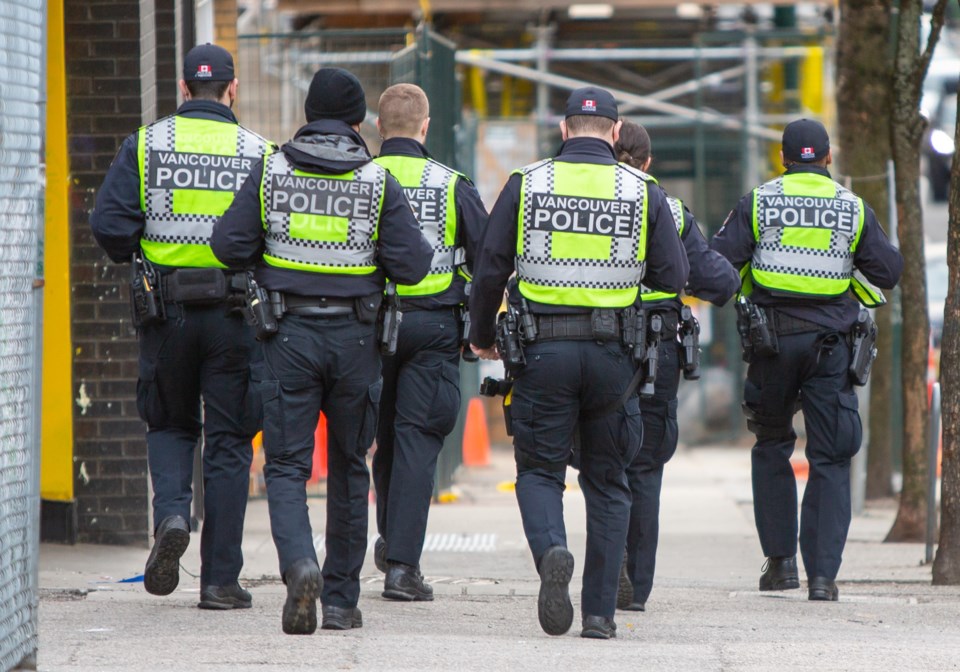B.C.’s police complaint commissioner has recommended the �鶹��ýӳ��Police Board review the police department’s policy for attending sudden death calls after receiving a complaint from a woman alleging a “deficient investigation” of her daughter’s death at an Indigenous affordable housing complex.
Clayton Pecknold outlined his concerns in an April 14 letter to Mayor Ken Sim, who doubles as chairperson of the police board, about an investigation that began after the complaint was filed in March 2021.
The investigation recently concluded, which prompted Pecknold’s letter.
Pecknold doesn’t identify the complainant or her daughter, or where the death occurred, but said the BC Coroners Service confirmed the death was “accidental.” Pecknold didn’t disclose cause of death, but suggested it was from a drug overdose.
That suggestion is based on his summary of the police investigation, which led to a discipline proceeding of the officer involved. A retired judge, who conducted the proceeding, highlighted the evidence of a senior �鶹��ýӳ��Police Department officer in charge of overseeing sudden death investigations.
According to Pecknold, the retired judge “commented that the increased number of sudden death overdose cases have made investigations of apparent overdoses ‘something of a routine matter’ and have resulted in instances where investigations are not conducted in as fulsome a manner as envisioned by VPD policy and training provided by the [Justice Institute of BC].”
'Mistreatment'
The officer in question was ultimately found not to have committed misconduct, despite the complainant’s allegation of “a deficient police investigation and mistreatment by a VPD member” during the course of the investigation.
The complainant and her daughter identified as Indigenous.
“The retired judge, however, did find that the member failed to adequately document details in relation to the appearance of the scene and obtain witness statements, which fell short of the standards set out in departmental policy and the Justice Institute of BC training manual,” Pecknold wrote.
Pecknold said the retired judge remarked that the JIBC materials outline the respective roles of the coroner and of police officers in investigations, with the “investigative objective for officers, in part, is to obtain information about the identity of the deceased and the circumstances surrounding the death [where, when, and by what means].”
The retired judge further stated that, while the officer explained he believed his duties were discharged by the coroner’s indication that the death was accidental, the policy and manuals specifically state that such an assessment “does not relieve attending officers of fulfilling their function of answering questions surrounding the death.”
'Not trained sufficiently'
In reflecting on the evidence of the senior VPD officer in the case, the retired judge concluded that such evidence supports the view that police “are not trained sufficiently to the standards, or that the increased demand on resources caused by the opioid crisis has diminished the expectations of officers to ensure complete documentation with respect to sudden death investigations.”
Added Pecknold: “Accordingly, the retired judge recommended that VPD members could benefit from a renewed emphasis during regular cycle training on the regulations and policies with respect to sudden death investigations, and that supervisors could be encouraged to take a more direct role in evaluating sudden death investigations, including providing guidance where appropriate.”
The police board’s complaint review committee is scheduled Thursday to discuss Pecknold’s recommendations related to sudden death investigations. The committee will also consider a separate case involving the overdose death of a person’s daughter in a Downtown Eastside single-room-occupancy hotel.
Details of the deceased were not provided in Pecknold’s letter, but that case was also driven by a complaint — in December 2021 — that ended with the conclusion that officers involved had not conducted misconduct.
Pecknold again pointed to the overdose death crisis in outlining his recommendations for further review of the VPD’s response to sudden deaths.
He noted that an officer in the case said at the time that all 19 sudden death investigations they conducted in the Downtown Eastside were the result of accidental overdose, or caused by medical distress.
'Marginalized communities'
He said both cases highlight the deference that appears to be placed on the coroner’s assessment, notwithstanding the fact that it is the duty of police officers to investigate the circumstances of a death and exclude the likelihood of it being a crime.
“Additionally, these examples are illustrative of the apparent impact that the opioid crisis has had on police response to sudden deaths precipitated by the opioid crisis,” Pecknold said.
“Given the disproportionate impact of the opioid crisis on marginalized communities, it may also be noted that these matters relate to the promotion of equitable and unbiased service delivery to socially and/or racially marginalized communities, which is expressed through the provincial policing standards.”
The cases before the police board come as the BC Coroners Service released new data Wednesday on the number of overdose deaths in the province — 184 people, or an average of six people per day, died in June of a drug overdose.
More than 1,200 people have died in B.C. of a drug overdose between January and June, with 328 recorded in Vancouver. Surrey lost 116 people for the same period, with the Greater Victoria area recording 80 deaths.
Thursday’s police board meeting is scheduled for 1 p.m. at the VPD’s Cambie Street precinct.




